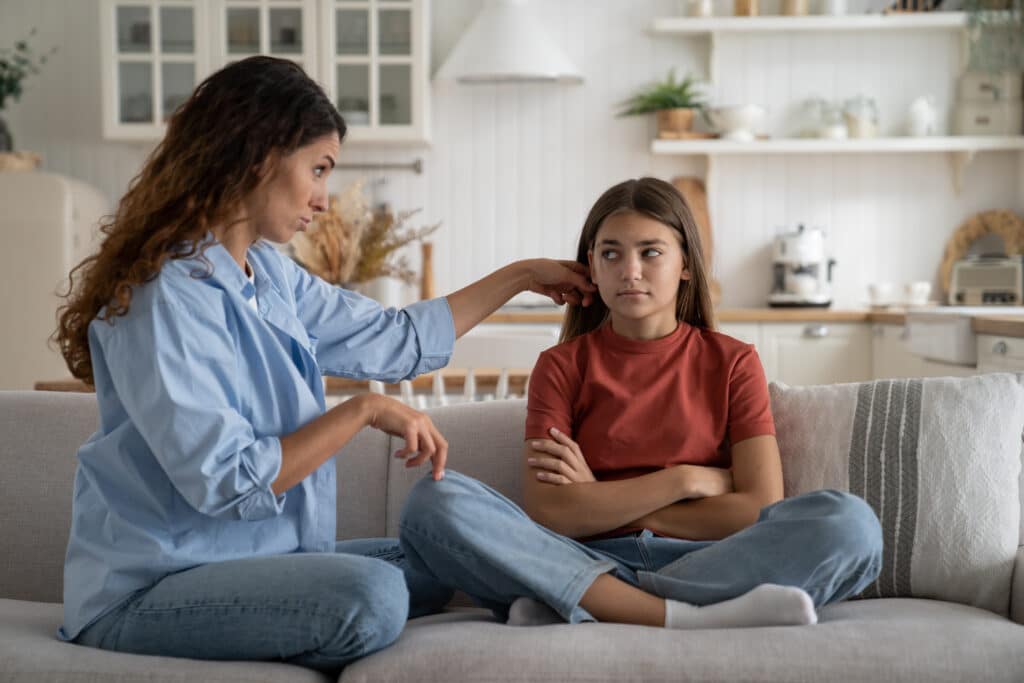Parenting an Anxious Child
Parenting an anxious child can be difficult, especially if you’re on the anxious side yourself. It’s normal to feel unsure of how to handle your child’s anxiety, or a little lost about how to best support them. But know that you’re not alone.
Anxiety is becoming an increasing concern in children and adolescents. According to the CDC, 10% of children in the U.S. between the ages of 3 and 17 have a diagnosed anxiety disorder. And among U.S. adolescents between the ages of 12 and 17, an overwhelming 21% report experiencing symptoms of anxiety.1
It’s often difficult as a parent to know when your child’s fears and worries are normal and when it’s time to seek professional help.2 But don’t worry, having access to the right information can build your confidence and help you get the support your child needs.
In this article, we will explore common causes of anxiety in children and the 7 best ways to help an anxious child. We will also look at when it’s appropriate to seek professional mental health treatment for a child with anxiety.
What Causes Anxiety in Children?
There can be a number of reasons why a child is anxious.3 Every kid is unique and their responses to situations can vary based on their individual temperament. Plus, anxiety is rarely down to one singular cause, and while—as parents—it’s normal to blame ourselves, know that there is often a combination of factors at play.
Here are some common causes of anxiety in children:
- Genetics. Anxiety can be passed down in families. If a parent or family member has an anxiety disorder, the child is more likely to also develop anxiety.3
- Academic difficulties. A child may develop anxiety if schoolwork is difficult or confusing, or if they do not have positive relationships with their teachers.4
- Problems within the family. Frequent family disputes, such as parents arguing or shouting, can increase the likelihood of anxiety in a child. A divorce or separation can also be distressing for a child.3
- Sudden or frequent life transitions. Moving house or schools on multiple occasions, and relocating to different areas, can elevate a child’s anxiety levels.5
- Struggling with other health or mental health conditions. Children are often more prone to anxiety if they already struggle with another health or mental health condition, such as attention deficit hyperactivity disorder or autism spectrum disorder.5
- Traumatic life events. Children may become anxious when they experience a serious life event like the death of a parent or close relative. Children who witness violence or are victims of abuse are also more prone to develop anxiety.6
As you can see, many of the factors contributing to a child’s anxiety are outside of our control. While we can’t always prevent events that will trigger anxiety in our children, we can learn strategies to help them through their anxiety. What’s more, we can also clue ourselves up on the best support services to help them.
7 Best Ways to Help an Anxious Child
No parent enjoys seeing their child in distress, but no one ever really teaches us how exactly to support a child with anxiety. What’s more, it can be a fine line between responding to a child’s anxiety in unhealthy ways that enable their worries and fears or using healthy methods to ease their worries.
If you are looking for the best ways to help your anxious child, here are 7 tips you can follow.
- Help your child learn how to tolerate their anxiety
A parent’s first instinct may be to allow their child to avoid situations that they find stressful. However, children cannot develop the confidence they need if they never face their fears. It’s important for a parent to help guide their child with care and support.
As children gain more experience navigating difficult situations, they learn to tolerate their anxious feelings.
- Empathize with your child’s feelings without indulging these
Empathizing with a child helps them feel heard and valued. Empathizing does not necessarily mean, however, that a child should be allowed to avoid challenging situations.
It’s important for a child to know that it’s normal to feel nervous, worried, or even scared. It’s also just as important for them to know that even if they are feeling anxious, they are still capable of dealing with any situation.
This takes a careful balance of validation and boundaries. For example, “Starting a new school year is tough. That makes total sense. Remember last year when you were scared but you overcame it? I believe you can do it this year, too.”
- Reality test with your child
Anxious kids (and anxious adults for that matter!) tend to expect the worst possible outcomes from difficult situations. They may predict every possible outcome under the sun, and worry that the worst possible outcome is going to happen.
Take the time to talk about why such an outcome is unlikely, even if there’s a possibility that it could happen. However, be careful not to invalidate their feelings. Talk about this as only one outcome, and work through all of the other possible outcomes with them, so their worries lose weight. This should include the possibility that even a positive outcome can happen.
- Help your child deal with uncertainty
A child with anxiety may have difficulty dealing with the unknown. They often want to know exactly what will happen in a challenging situation so that they can feel like they have power or control. With love and support, consistently reinforce that they are capable of managing any outcome, even if it’s not the outcome that they expect or want.
It can help to instill a growth—rather than a fixed—mindset in your child in other situations, as this can help them understand that they are capable of learning and managing difficult situations and challenges. You can do this by voicing your own difficulties. For example, “I baked a cake today, but I didn’t put enough eggs in, so it hasn’t worked out. Ah well, this will help me get better next time.”
- Maintain clear boundaries and rules
It’s easy to want to accommodate an anxious child. However, there is safety in boundaries, and all children tend to thrive when there are clear rules and expectations at home. While we can’t expect our children to love our boundaries and rules, staying consistent with our expectations can help build trust and allow us to keep our children safe.
What’s more, the world can be a scary or anxiety-inducing place, and with such little control over the world, children can feel this intensely. As such, children of all ages feel more secure when they know that their parents are in charge.
- Be aware of your own anxiety
Our children closely monitor our experiences and actions. So, if we are on the anxious side of life, our children will pick up on this. That’s why, when you become aware of your child’s anxiety, it’s first important to look inwards. Do you find yourself frequently worrying about possible outcomes? Do you struggle with confidence in new situations?
Monitor and reflect on your own feelings and work to keep your own anxiety in check. Meanwhile, consistently convey full confidence in your child’s ability to tolerate their anxious feelings and manage any situation.
- Seek professional mental health support
Sometimes an anxious child may need more support than what a parent can provide. And sometimes, we as parents may need support to show up in the best way possible for our anxious children.
If your kid’s anxiety is escalating and impacting their daily functioning, it’s time to seek professional help.
When to Worry About Child Anxiety
Even with the highest level of care and support from a parent, sometimes children show warning signs indicating the need for professional therapeutic support.2 These warning signs may include:
- Panic attacks
- Staying away from social situations
- Extreme separation anxiety.
- Refusing to attend school.
- Skipping classes while at school.
While these behaviors may cause a great deal of worry for parents, professional help for anxious kids is readily available.
Final Word on How to Help an Anxious Child
Anxiety can be a normal experience for kids as they learn and grow. The reality is, however, that the levels of anxiety in children continue to be of increasing concern. The good news is that you’re not alone in raising an anxious child and professional help is available.
The mental health professionals at Mission Prep Healthcare offer exceptional mental health treatment for adolescents and teens. Mission Prep provides highly personalized treatment options to best meet the needs of anxious children and their caregivers. Mission Prep takes a whole family approach to treatment and prioritizes the close involvement of parents and families.
Reach out to us through the Mission Prep Healthcare support line to speak with a compassionate member of our team and learn more about our treatment options. We will offer confidential support, advice, and information about our treatment center, resources, and services.
Remember that you’re not alone in raising an anxious child. Let us help you and your family at Mission Prep Healthcare and support your child on their journey to recovery.
References
- U.S. Centers for Disease Control and Prevention. (2024, August 19). Data and Statistics on Children’s Mental Health. https://www.cdc.gov/children-mental-health/data-research/index.html
- Ramsawh, H. J., Chavira, D. A., & Stein, M. B. (2010). Burden of anxiety disorders in pediatric medical settings: prevalence, phenomenology, and a research agenda. Archives of Pediatrics & Adolescent Medicine, 164(10), 965–972. https://doi.org/10.1001/archpediatrics.2010.170
- Mental Health Foundation. (2024, December). The Anxious Child. https://www.mentalhealth.org.uk/explore-mental-health/publications/anxious-child
- Young Minds. (2022, December). School anxiety and refusal. https://www.youngminds.org.uk/parent/parents-a-z-mental-health-guide/school-anxiety-and-refusal/
- NHS (2023, December 15). Anxiety disorders in children. https://www.nhs.uk/mental-health/children-and-young-adults/advice-for-parents/anxiety-disorders-in-children/
- Nemours KidsHealth. (2023, June). Anxiety Disorders. https://kidshealth.org/en/parents/anxiety-disorders.html#:~:text=These%20symptoms%20of%20anxiety%20are,Learned%20behaviors.















